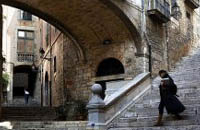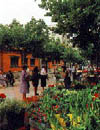Club of Amsterdam

Moderated by ![]() Humberto Schwab, Director, Club of Amsterdam, Innovation Philosopher
Humberto Schwab, Director, Club of Amsterdam, Innovation Philosopher
With the Thought Leaders
![]() Nathalie Horbach, Centre for Energy, Petroleum and Mineral Law and Policy, University of Dundee
Nathalie Horbach, Centre for Energy, Petroleum and Mineral Law and Policy, University of Dundee
![]() Simon Taylor, Director and Co-Founder, Global Witness
Simon Taylor, Director and Co-Founder, Global Witness
![]() Christof van Agt
Christof van Agt
![]() Paul Holister, Nanotechnology & Energy
Paul Holister, Nanotechnology & Energy
Results of the Club of Amsterdam Lab on ‘Old and New Energy’
![]() download report
download report
Change agents will brainstorm on concrete tangible models to embody all the things we already know in a perspective of person-to-person acting.
The “old and new energy” lab will, by sharing high-qualified knowledge and experience, innovate the way we think, act and feel regarding energy. We have to change above all our way of experiencing energy. We need change agents to deconstruct concepts and construct new ones.
Moderated by
![]() Humberto Schwab, Director, Club of Amsterdam, Innovation Philosopher
Humberto Schwab, Director, Club of Amsterdam, Innovation Philosopher
and the Thought Leaders
![]() Nathalie Horbach, Centre for Energy, Petroleum and Mineral Law and Policy, University of Dundee
Nathalie Horbach, Centre for Energy, Petroleum and Mineral Law and Policy, University of Dundee
… Nuclear energy provides for a credible alternative source of electricity. It does not emit CO2 although, similar to renewable energy sources, emissions are not entirely zero. Due to the need to mitigate recognized risks, nuclear energy has the most secured and innovative energy fuel cycle, in respect of both strict international and national safety and liability regulation (polluter-pays), including internalization of such costs in the electricity price. …
![]() Simon Taylor, Director and Co-Founder, Global Witness
Simon Taylor, Director and Co-Founder, Global Witness
… The output needs to be nothing short of a global revolution around the way in which we generate and utilize energy and its subsequent equitable availability. Nothing less will suffice. Whilst this might sound dismissive, nuclear power would seem to be an unnecessary distraction which does nothing to address either our overall energy requirements, or the overall use of carbon intensive energy sources – and that is before we consider the implications of the complete lack of adequate waste management, the propensity for increased nuclear use to create its own security of supply problem, the appalling overall record of the industry when it comes to onsite safety and maintenance, and the increased risks of nuclear proliferation and the potential for terrorism. …
![]() Christof van Agt
Christof van Agt
![]() Paul Holister, Nanotechnology & Energy
Paul Holister, Nanotechnology & Energy
… Nanotechnology operates at such a fundamental level that there is very little of a technological nature that it will not impact. Thus its effects on energy generation, transmission, storage and consumption are numerous and diverse. Some will be incremental and some quite possibly revolutionary …
Using the following tools:
Value and appreciative inquiry
To establish the basic personal values, those are tangible in this matter? To discover and share our best experiences in deconstructing this theme.
Socratic discourse
To establish the basic questions and analysis: Is the way we have put this theme till now the right one? Is economy the adequate framework for energy? Etc.
Brainstorm methods
Work on new concepts, frameworks and hybrid approaches. With Future Scenario methods and other reflective tools.
Who should attend
Experts in hybrid fields related to energy.
People of all sectors (consultancy, academia, education, SME’s etc.) that have hybrid knowledge on energy or/and want to foster concrete action.
Persons who have birds eye view on the bridges between energy and other domains.
Persons who have a drive to change the “energy discourse” .
Why
In the future new concepts will mark these fields.
Specialists often remain in their domains and seldom participate in fundamental brainstorm with experts from other domains.
The concept of energy is fundamentally related with values in our daily life. Cross over dialogue can create a new framework of meaning to facilitate effective actions on different levels, in our daily life.
Benefits
You will take home some hybrid approaches of your key topics, you will have experienced the force of Socratic dialogue and you will have a personal action plan.




Nathalie Horbach
Centre for Energy, Petroleum and Mineral Law and Policy, University of Dundee
Dr. Nathalie Louisa Johanna Theodora Horbach teaches on the Nuclear Law and Policy course at the CEPMLP where she is involved on a part-time basis in this new specialisation within Energy and Natural Resources, i.e. the Nuclear Law & Policy Programme (LLM and PhD).
Dr. Horbach obtained her law degree from the University of Leiden, Faculty of Law, with a specialisation in public international law, comparative law and international environmental law and studied economics at the University of Amsterdam. She obtained a doctorate at the University of Leiden, Faculty of Public International Law on the topic Liability versus Responsibility under International Law: Defending Strict State Responsibility for Transboundary Damage (1996) and a fellowship for the international environmental law programme at the Georgetown University Law Center, Washington D.C.(USA). Prizes won include the ‘Willoughby Prize’ (1996); Van Vollenhoven’ prize, best bi-annual thesis on International Law (1992); Best oralist award of 1990 Philip C Jessup International Law Moot Court Competition. As a Legal Consultant to the OECD Nuclear Energy Agency (Paris, France), she worked in areas of nuclear energy law, international public law and comparative nuclear energy law, involving editing various NEA publications, analysing national legal issues [involving radioactive waste management, radiation protection, emergency preparedness, non-proliferation, etc.] organising seminars and preparatory meetings of nuclear liability conventions and working groups. From 1994 to 1997 she was employed by the International Institute of Energy Law of the Leiden University, where she was lecturer and research fellow, specialised in international nuclear energy law. She participated as nuclear energy law specialist in the EU PHARE and TACIS programmes on the European Energy Charter Treaty; as well as other assistance projects.
She currently is member of the Legal Advisory Task Force on Model Agreements of the Energy Charter Secretariat (Brussels, Belgium), the OECD/NEA Contact Group on Nuclear Liability Questions raised by Nuclear Safety Assistance Programmes, the editorial board of the Journal for Energy and Natural Resources Law, the International Nuclear Law Association (Secretary to INLA Working Group II on Liability and Cover), as well as a member of the European Nuclear Society, Netherlands Nuclear Society, Dutch Young Generation, Young Nuclear Society, and last but not least, the Public International Law Association ‘Prof. mr B.M. Telders’.
www.cepmlp.org

Simon Taylor
Director and Co-Founder, Global Witness
Global Witness exposes the corrupt exploitation of natural resources and international trade systems, to drive campaigns that end impunity, resource-linked conflict, and human rights and environmental abuses.
The competition between the old and emerging powers to secure the world’s remaining oil reserves is escalating, perhaps dangerously so. The scramble by extractive industries to secure exploitation rights over the world’s mineral wealth, whilst at the same time resisting any kind of regulation that would enforce good practice, threatens some of the planet’s poorest populations, whilst the world’s dwindling forests, home to millions of people and reservoirs of biodiversity, continue to face an onslaught by some of the most corrupt regimes and companies, bent on satisfying an insatiable demand for timber regardless of cost.
www.globalwitness.org

Christof van Agt
Since 2001 Mr. Van Agt works for the International Energy Agency at the Office for Non-Member Countries in Paris where he is the administrator for Countries of the Caspian Sea Region and Central Asia. He manages IEA relations with Caspian and Central Asian States and the Agency’s permanent policy dialogue on energy market and investment climate development with this important region.
From 1998 to 2001 Mr. Van Agt worked in the Secretariat of the Energy Charter Conference in Brussels at the Directorate for Transit and Trade. He co authored a report on transit for the G8 Energy Ministers Meeting of April 1998 in Moscow and assisted in negotiations on the Energy Charter Protocol on Transit and Model Agreements for Cross Border Pipelines in 1999. An Inter-Governmental Model Agreement (IGA) and a Host-Government Model Agreement (HGA) were approved by the Energy Charter Conference Meeting of December 2003.
From 1996 to 1998 Mr. Van Agt worked for the European Commissions Directorate General for Foreign Economic Relations and Common Security Policy on energy related assistance projects in Central Asia and the Caucasus including cooperation on interstate oil and gas transport networks. Among others he assisted Turkmenistan in launching a first licensing round of offshore acreage and Georgia in negotiations on the first independent oil pipeline in the Caucasus from Baku to Supsa.
From 1991 to 1996 Mr. Van Agt worked for the International Institute for Energy Law at the Faculty of Public International Law of the University of Leiden on economic and legal reform in the Newly Independent States (NIS) for international organizations and financial institutions. For the Energy Charter process Mr. Van Agt coordinated conferences in all NIS and several Central European Countries with the Centre for Energy Petroleum and Mineral Law & Policy at the University of Dundee Scotland next to various law and consultancy firms.
Born in Nijmegen, The Netherlands in 1964, Christof van Agt studied Slavonic Languages at the University of Leiden, the Herzen Institute in Leningrad and Moscow and ‘sovietology’; multidisciplinary studies in Russian, law, economy, history and political sciences at the University of Leiden, Faculty of Law from 1986 to 1991.

Paul Holister
Nanotechnology & Energy
Paul Holister is a consultant specialising in, among other things, the commercial and societal impacts of new technologies. He is currently writing “Nanotechnology and the Future of Energy”, to be published by John Wiley and Sons.
Paul’s consulting background includes many years in the oil and gas sector as a business analyst and system designer, working for multinationals such as Shell and Oracle.
He was an early entrant into nanotechnology-related consulting, launching a popular nanobusiness newsletter in 2000 and writing the well-received Nanotechnology Opportunity Report in 2002. In addition to nanotechnology-related consulting for a broad spectrum of businesses, he has been an expert advisor on nanotechnology to the EU and the UK’s Royal Society.

Humberto Schwab
Director, Club of Amsterdam
Innovation Philosopher, EuroLAB
Humberto Schwab was born 1953 in Surabaya (Indonesia). He now lives in Amsterdam and in Spain (province Girona).
Humberto Schwab studied physics and philosophy at the University of Amsterdam, he worked at the Montessori Lyceum Amsterdam, the Gerrit Rietveld Academie and at the Hogeschool van Amsterdam.
He designed a philosophy method for high and higher education and published on several aspects of education. He was the driving force behind parliaments approval in 1998, of the introduction of philosophy in the Dutch high school system. An innovative training course for teachers was designed and executed by Humberto Schwab at the University of Amsterdam.
He developed several philosophy techniques like the value brainstorm, concept analysis, differential analysis, assumption analysis and think tank teaching method. He adjusted the Socratic discourse for educational contexts. He co-designed the philosophy curriculum for the Dutch high school system.
He trained several organisations in reflection on mission and ethics, and advised governmental and other organisations on cultural affairs. In the annual festival of philosophy he acts as “stand up philosopher”. He is chair of the Kalos society, which aims to improve the presence of intellectual youngsters in the public domain.
Humberto Schwab has developed the EuroLAB method, in which the Socratic discourse and the future scenario method are synthesized in a training format in which participants reflect on their position here and now by looking into a designed future. The participants combine all their knowledge to make different, challenging scenarios.
The EuroLAB is also a learning method in which students from different countries participate to brainstorm on urgent European matters. They produce an advice for the European government on the chosen subject (migration, water politics, media etc.). They learn by producing. Also they acquire international experience. In the Pyrenean area in Girona (Spain) the EuroLAB is developing steadily into a real virtual laboratory. Learning in an urgent context, and innovate educational systems is his main target now.
www.xs4all.nl/~schwab






Customer Reviews
Thanks for submitting your comment!